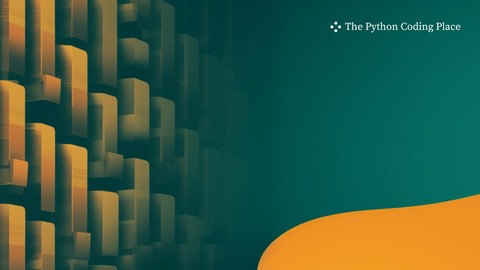
A Python Tale • A Relaxed Programming Course for Beginners
A Python Tale • A Relaxed Programming Course for Beginners, available at $54.99, has an average rating of 4.79, with 90 lectures, based on 7 reviews, and has 1143 subscribers.
You will learn about Understand the fundamentals of writing a Python computer program Understand the mindset needed for communicating with a computer through a program Learn key foundational topics, including loops, defining functions, conditional statements, data types and data structures Gain confidence to write programs independently This course is ideal for individuals who are Beginners starting to learn to code using Python or Students who have tried to learn in the past but gave up! It is particularly useful for Beginners starting to learn to code using Python or Students who have tried to learn in the past but gave up!.
Enroll now: A Python Tale • A Relaxed Programming Course for Beginners
Summary
Title: A Python Tale • A Relaxed Programming Course for Beginners
Price: $54.99
Average Rating: 4.79
Number of Lectures: 90
Number of Published Lectures: 90
Number of Curriculum Items: 90
Number of Published Curriculum Objects: 90
Original Price: $19.99
Quality Status: approved
Status: Live
What You Will Learn
- Understand the fundamentals of writing a Python computer program
- Understand the mindset needed for communicating with a computer through a program
- Learn key foundational topics, including loops, defining functions, conditional statements, data types and data structures
- Gain confidence to write programs independently
Who Should Attend
- Beginners starting to learn to code using Python
- Students who have tried to learn in the past but gave up!
Target Audiences
- Beginners starting to learn to code using Python
- Students who have tried to learn in the past but gave up!
A different way of learning to code in Python. This course takes you through the basics of programming in a teaching style that’s friendly and relaxed.
The focus is on clarity and really understanding what’s going on.
I’ve been teaching Python coding for a decade and I’m the author of The Python Coding Book(just ask Google for a “python book”!)
My teaching style is different. Try out the first few lessons and if it’s your style, then we’ll be together for a many hours.
No prior experience of Python or coding is required. This is a beginner’s course.
Or perhaps you’re not a beginner, but you’ve done a bit of coding in the past but didn’t carry on. It wasn’t you, it’s likely you didn’t find the resources that speak directly to you. I can’t promise my style is what you’re looking for, but you’ll know after the first few lessons!
In this course you’ll learn:
-
How to apply the key principles and mindset for communicating with a computer through programming
-
How to repeat blocks of code using `for` loops and `while` loops
-
How to store data using variables and using various data types
-
How to define your own functions to re-use code
-
How to use data structures including lists, dictionaries, and tuples
-
How to read data from external text files and spreadsheets and write data to these file formats
-
How to apply best practices when coding
This course will teach you all the fundamental tools, of course, but more importantly, it will teach you the right mindset for programming. This is just as important as learning all the programming techniques—if not more important.
And you’ll also meet Monty, the main character in an analogy I love which I’ll share with you in this course—trust me, this analogy alone is worth your time as Python programming will make so much more sense…
Course Curriculum
Chapter 1: The Tale Starts Here
Lecture 1: Let's Make a Start
Lecture 2: What's Coding? Here's My View…
Lecture 3: Installing Python and Other Tools
Lecture 4: Finding The Goblin • Introduction to the project
Lecture 5: Talk To Me • `print()`, `input()`, and strings
Lecture 6: Store This In A Box • Variables
Lecture 7: Sticking Strings Together • Concatenation
Lecture 8: Deciding What To Do • `if` statements
Lecture 9: Squashing Your First Bug
Lecture 10: On and on • `while` loop
Lecture 11: On and on but not forever • more `while` loop
Lecture 12: Fetching more Python stuff • Importing modules
Lecture 13: Finishing Touches
Lecture 14: A bit extra: More on `if` statements
Lecture 15: Final word
Lecture 16: Exercises for Section 1
Chapter 2: Loops, Lists and Other Stories
Lecture 1: Where Are We in This Tale?
Lecture 2: Meet Monty (Introduction to the central analogy in A Python Tale)
Lecture 3: Monty Starts His Adventures
Lecture 4: Is It DRY? (`for` loops)
Lecture 5: More On The `for` Loop
Lecture 6: Revisiting The `while` Loop (Comparing `for` and `while`)
Lecture 7: Indents Are Not Just Decorative
Lecture 8: Storing Several Items in One Box (Lists)
Lecture 9: Finding Things in The Box (Indexing and slicing)
Lecture 10: More Slicing
Lecture 11: And One More List Fact
Lecture 12: Looping Through Lists
Lecture 13: Final Word
Lecture 14: Who am I? (If you care…)
Lecture 15: Exercises for Section 2
Chapter 3: Choosing a Baby Name • Functions
Lecture 1: The Road We've Already Travelled
Lecture 2: The Baby Name Project • Introducing the project
Lecture 3: First, Solve The Problem. Then, Write The Code
Lecture 4: Accessing Files You'll Need • Adding them to the Python project
Lecture 5: The First Iteration • Getting started
Lecture 6: Indexing Revisited
Lecture 7: Back To The First Iteration
Lecture 8: Repeating Our Code For All The Names
Lecture 9: Adding Names To An Empty List • Introduction to methods
Lecture 10: I Want To Reuse This Code • Defining functions
Lecture 11: Monty and The Function Room
Lecture 12: Local Variables and Returning Data • return statement
Lecture 13: Calling The Function
Lecture 14: Making The Function More Flexible • Parameters and arguments (Part 1)
Lecture 15: Making The Function More Flexible • Parameters and arguments (Part 2)
Lecture 16: Defining Another Function
Lecture 17: More Parameters, More Arguments
Lecture 18: Revisiting Monty and The Function Room
Lecture 19: Monty's Complaints • Error messages when calling functions
Lecture 20: Final Word
Lecture 21: Exercises for Section 3
Chapter 4: Pride & Prejudice • Data, Data Types and Data Structures
Lecture 1: Data, Data, and Data • Chapter overview
Lecture 2: Subject-Specific and Programming-Specific Knowledge
Lecture 3: Some Data Type Categories • Iterables and Sequences
Lecture 4: Some Data Type Categories • Mutable and Immutable
Lecture 5: What Can This Data Do? • Methods associated with data types
Lecture 6: Revisiting Mutable and Immutable Data Types
Lecture 7: More Ways of Storing Stuff • Data Structures
Lecture 8: Single, Double, Triple, Quadruple… Tuple
Lecture 9: The Python Dictionary (not that type of dictionary, no)
Lecture 10: And A Bit More About Dictionaries
Lecture 11: Pride & Prejudice • Introducing the new project • Reading from a text file
Lecture 12: Splitting The Text Into Words
Lecture 13: Cleaning Required • Cleaning the data (Part 1)
Lecture 14: Cleaning Required • Cleaning the data (Part 2)
Lecture 15: What Are The Most Common Words Jane Austen Used?
Lecture 16: Reviewing The Algorithm
Lecture 17: Share Your Results • Writing results to a spreadsheet
Lecture 18: Looping Through Dictionaries
Lecture 19: Back To Exporting To A Spreadsheet
Lecture 20: Some Extras…
Lecture 21: Final Word
Lecture 22: Exercises for Chapter 4
Chapter 5: Epilogue: Monty and The White Room (plus an extra project)
Lecture 1: What's In This Epilogue
Lecture 2: Bouncing a Ball • Introduction to the project
Lecture 3: Create a Ball • The `turtle` module
Lecture 4: A Very Brief `turtle` Primer
Lecture 5: Drop the Ball
Lecture 6: Now Add Gravity
Lecture 7: Controlling When Things Are Displayed On Your Screen
Lecture 8: Bounce The Ball
Lecture 9: Bounce The Ball (properly)
Lecture 10: Throw The Ball Sideways
Lecture 11: Don't Forget The Walls
Lecture 12: Finishing Touches
Lecture 13: Monty and The White Room • The main room
Lecture 14: Monty and The White Room • The function room
Lecture 15: Monty and The White Room • Python City
Lecture 16: The Final Final Word (for this course!)
Instructors
-
Stephen Gruppetta
Python Educator
Rating Distribution
- 1 stars: 0 votes
- 2 stars: 0 votes
- 3 stars: 0 votes
- 4 stars: 2 votes
- 5 stars: 5 votes
Frequently Asked Questions
How long do I have access to the course materials?
You can view and review the lecture materials indefinitely, like an on-demand channel.
Can I take my courses with me wherever I go?
Definitely! If you have an internet connection, courses on Udemy are available on any device at any time. If you don’t have an internet connection, some instructors also let their students download course lectures. That’s up to the instructor though, so make sure you get on their good side!
You may also like
- Top 10 Mobile App Development Courses to Learn in December 2024
- Top 10 Graphic Design Courses to Learn in December 2024
- Top 10 Videography Courses to Learn in December 2024
- Top 10 Photography Courses to Learn in December 2024
- Top 10 Language Learning Courses to Learn in December 2024
- Top 10 Product Management Courses to Learn in December 2024
- Top 10 Investing Courses to Learn in December 2024
- Top 10 Personal Finance Courses to Learn in December 2024
- Top 10 Health And Wellness Courses to Learn in December 2024
- Top 10 Chatgpt And Ai Tools Courses to Learn in December 2024
- Top 10 Virtual Reality Courses to Learn in December 2024
- Top 10 Augmented Reality Courses to Learn in December 2024
- Top 10 Blockchain Development Courses to Learn in December 2024
- Top 10 Unity Game Development Courses to Learn in December 2024
- Top 10 Artificial Intelligence Courses to Learn in December 2024
- Top 10 Flutter Development Courses to Learn in December 2024
- Top 10 Docker Kubernetes Courses to Learn in December 2024
- Top 10 Business Analytics Courses to Learn in December 2024
- Top 10 Excel Vba Courses to Learn in December 2024
- Top 10 Devops Courses to Learn in December 2024






















